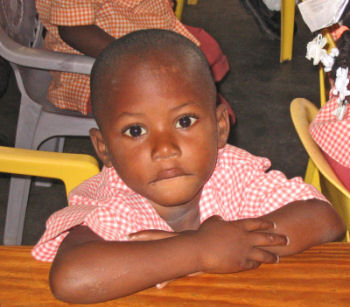Mud cakes to relieve hunger
19/06/2008
Like in other Central American countries prices for basic food have risen dramatically in the past couple of months. According to the UN, Haiti is one of the least developed countries in the world and one of the poorest in the western hemisphere.
Due of the difficult situation, a lot of people move from rural areas to cities. They hope for a better life, but are soon faced with an even worse situation, which results in the forming of ghettos and even more poverty. The provision of food is getting more and more difficult as prices continue to rise. Children and youths, and mainly babies, are the immediate victims of the crisis. Since more money is needed to cover food expenses, additional costs like school fees are becoming unaffordable and children do not attend school. In the meantime, the situation has worsened dramatically since many families rely on humanitarian aid.
Since 2007 the food prices have increased sharply and some products prices have even tripled within one year. Between January and February 2008, prices increased 76% .
Haitians mainly live on rice, beans, maize and other cereal. Since the local production of these products is not sufficient, the majority has to be imported. For example, the demand for rice is covered almost totally (95 %) by imports. These days, Haitians have to spend a large part of their income on food. They are buying different, less expensive products. For example, one kg rice equals 2.5 kg of cereal and people prefer to buy cereal than rice, because they can get a bigger quantity.
The still increasing prices for basic food such as cereal and rice forces the poorest of the country to live on mud cookies, so-called 'picas', whose price has also risen lately. The mud cookies, which are sometimes a combination of dirt, salt and vegetable shortening, are harming people's health. They cause malnutrition, intestinal distress and other illnesses caused by potential deadly toxins and parasites.
Consequences for the SOS Children's Village

The current difficult situation is also noticeable in the SOS Children's Villages. The SOS mothers try to get by with their budget and are looking for alternative solutions to cope. They buy less expensive food and change their cooking habits. They try to save money by not making large purchases and try to do without the small necessities. What is the most important are the children and their health.
The high food prices also have affected the family strengthening programmes of SOS Children Haiti. The price increase does not allow for the provision of the three meals per day that the children received until recently, money is only sufficient for one or two meals. Apart from supporting the children the programme also offers job training and reading and writing classes for adults.
However, at the moment the focus is on providing basic needs for children. Many families are seeking support with SOS Children Haiti, but with the current situation the organisation cannot take in more families in its programme.
Hunger revolt and flight
The recent developments have caused a lot of insecurity among the population and even led to uprisings in April 2008. As a consequence the Haitian Prime Minister Jacques-Édouard Alexis had to resign from his office.
Since the end of the Duvalier dictatorship in 1986, the neo-liberal politics of the Haitian government has opened the market for foreign products. This has had negative effects on the local market: the Haitian agricultural products started losing their value and a lot of know-how was lost.
In the poorest country of the continent the main reasons for the cost explosion of food are the continuing rise of the oil price, the current political crisis and the increasing inflation.
In recent years a lot of people decided to escape the economical misery in Haiti and mainly fled to the USA. Many of them risk their lives in boats that are unfit for the sea and try to make their way over the ocean for a better future. They often leave their children behind. In the country the spiral of poverty continues turning downward.
Relevant Countries: Haiti.